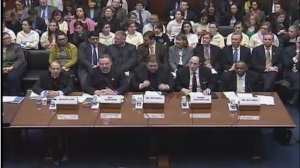It’s always bothered me that “girl,” with its infantile connotations, be a vague equivalent to “guy” or even “man” in certain informal contexts. Reading a thread about it out in the wilds, I feel the need to explore why exactly it is that more often than not, being referred to as a girl makes my eye twitch.
While you can try to take “girl” out of its female child meaning (by giving it other meanings), I say it’s impossible to take the female child meaning out of the word girl because (and this is my theory) native speakers learn it first to mean female child, which I think is safe to say by virtue of how children begin learning and applying words to themselves and their environment. Only later would a native speaker’s mental dictionary be appended to include a second (or broader) definition as an informal female “guy” or “man” equivalent. And not until later still, if at all, would the question of the various etymologies of those meaning be brought up. I would venture to say that for “girl,” order of exposure would have a greater influence in arranging the mental hierarchy of definitions over the more academic and removed order etymologies could offer. Now, for how this mental hierarchy of meanings is relevant…
To use a word with multiple meanings is to risk allusion to those other meanings, especially if one meaning is more frequent. The “primary” meaning will exert a kind of allusory influence over all other meanings, coloring their connotations in accordance with the strength of the allusion, which may differ between speaker and listener. For example: using “fag” in the UK’s cigarette sense in the US is not at all a good idea because of the derogatory meaning it has in the US. Take another word, “home,” for example would likely first be learned as the place where a child lives with their family. And in fact it is this sense that its euphemistic use in the phrase “retirement home” alludes to. “Home”‘s first meaning influences, indeed inspires, its other use and NOT the other way around! I think for some, myself included as well as others in this thread, non-primary uses of “girl” suffer this allusory influence from the female child meaning to the point that all secondary usage is distasteful.
Speaking as someone who at points past in her life was a child and thus was referred to as a girl, “girl” in the female child sense is first in my mind, particularly for having identified with it first for a significant portion of my life. I have not been a child now for many years and yet to have that same word still used to refer to me is at best imprecise and at worst insulting depending on usage, intent, etc. (most days, it’s merely irksome for lack of time one can afford to think on it and writing this remedies that itch somewhat.) But back to imprecise: imprecise in exactly the sense that for example, “corner” alone is imprecise for still having to specify between “IN the corner” versus “ON or AT the corner” whereas Spanish has words for each distinction: “rincón” and “esquina” respectively. “Girl” was part of my identity until I was no longer a child. But instead of wholly embracing “woman” as a new word for my new identity I am asked to keep the same word and merely accept that an arguably different (or broader) meaning is now intended. For using the same word, it’s no wonder the thought comes unbidden that perhaps those different meanings are not so different if a single word is deemed good enough.
As for intent and looking only at the “positive” connotations:
Interpretation by the listener is at least as valuable as the intent of the speaker. From a “standard resource on privilege:” “I was taught to see racism only in individual acts of meanness, not in invisible systems conferring dominance on my group.” Claiming the use of “girl” as a deliberate act of meanness is simple and straightforward enough. However, what’s at work here and what’s problematic with “girl” is how it perpetuates unearned dominance of the male in that “man” or “guy” do not suffer the connotations of immaturity, inexperience, and weakness that do color the meaning of “girl” when used in the same informal sense that “man” and “guy” are used.The good and the bad are tied up in one word, there is ambiguity that exists in “girl” and that ambiguity risks greater disconnect between speaker intent and listener interpretation.
Merely ignoring certain connotations does not make them go away. Secondary uses of “girl” influence women in ways it can NEVER influence men by virtue of the fact that “girl” can be applied both negatively and positively to women’s identity: being referred to or labeled as such. Thus, women’s identity is tied into ALL the meanings and connotations of “girl.” Yes, perhaps youthfulness, vibrancy, and liveliness, but also inexperience, weakness, and immaturity. Using “girl” beyond its primary sense risks the perpetuation of the connotations of inexperience, weakness, and immaturity, to larger groups. While those connotations are applicable in the female child sense as much as they are applicable to “boy,” they are very much unwelcome in the informal “man” or “guy” equivalent sense of “girl,” not to mention wholly absent in the connotations of “man” or “guy.” The notion of a function not being well-defined if for a given x there exists more than one f(x) keeps coming to mind. (the word girl) (definitions of the word girl) Function in this analogy would then be… language? communication? and well-defined would be success so… Language is not successful if a given word has more than one meaning. Ok, that’s not particularly illuminating, but it’s still a true statement.
Anyways, tl;dr: “Girl” means female child MORE than it means anything else because it’s the first definition native speakers are exposed to / identify with. “Girl” in any other sense cannot escape that first definition. Using “girl” in any non-primary sense is therefore ambiguous and this ambiguity is ultimately harmful to women in general because of negative connotations unwittingly inherited from the primary sense. Thus, it is desirable and preferable to avoid using “girl” in any but its primary sense. QED.
Posted in Linguistics
Tags: intent versus perception, language, sexism


